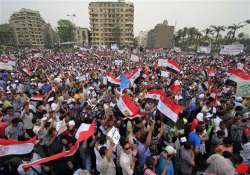Thousands Flock To Tahrir Square For 'Second Revolution'
Cairo, May 28: Thousands of protesters returned to Cairo's Tahrir Square on Friday for what they called a "second revolution," calling on Egypt's military rulers to speed up the pace of democratic reforms in a

Cairo, May 28: Thousands of protesters returned to Cairo's Tahrir Square on Friday for what they called a "second revolution," calling on Egypt's military rulers to speed up the pace of democratic reforms in a country which is still charting its political future.
Christians and Muslims took turns praying in Tahrir Square, as they did during the tumultuous 18 days of protests which led to President Hosni Mubarak stepping down from power on 11 February.
Many Egyptians have been left dissatisfied by the military, who have been in charge of the country's transitional period, frustrated at the pace of change.
"We want them (military rulers) to speed up trials of corrupt officials," activist Tarek El Nahry said.
"We need a new constitution, and we want a civilian presidential council to rule us."
Some protesters have accused the military rulers of collaborating with the former regime and being too lenient in its prosecution of Mubarak, his family and regime members.
Protesters also accuse the army of using excessive force in cracking down on peaceful protesters since Mubarak's removal, sending thousands to military tribunals and detaining young protesters.
Two days before Friday's protest, the prosecutor general ordered Mubarak and his sons to be tried over charges of ordering the killing of protesters during the uprising, along with other charges, a move seen as an attempt to prevent protesters from returning to Tahrir Square.
The Muslim Brotherhood, Egypt's best organised political force, opposed Friday's protest and called it an attempt to drive a wedge between the military and the people.
But speaking at the rally, Muslim Brotherhood member Mohamed Hussen said some young members of the group were participating in the rally to send a message to their elders.
"We are the fuel of this revolution and will never leave it until we have a new free constitution, a new, freely elected parliament, and a new president," he said.
The Brotherhood, banned in 1954, became a political force after renouncing violence in the 1970s.
Eventually it became the most formidable opponent to Mubarak's regime, and is expected to make major gains in parliamentary elections planned for September. AP